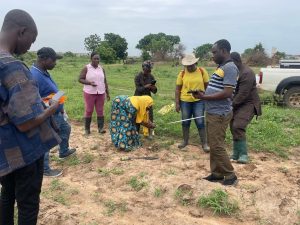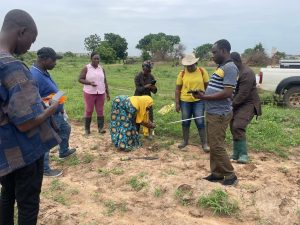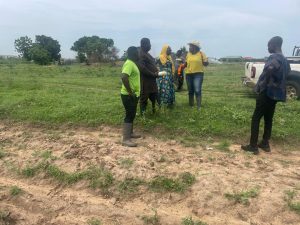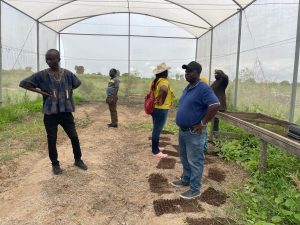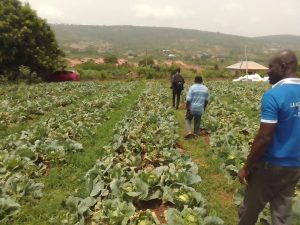In the second quarter of 2025, the Department of Agriculture, Kpone Katamanso Municipal Assembly, through its Municipal Director and Supervisors, continued its routine Monitoring and backstopping of field activities. These visits are part of efforts to ensure that Agricultural Extension Agents (AEAs) effectively deliver technical support and advisory services to farmers and other actors while implementing government agricultural policies and programs.
2.0 OBJECTIVES
The objectives of the second quarter monitoring were to:
- Assess progress of ongoing agricultural activities.
- Provide technical backstopping to Agricultural Extension Agents (AEAs) in all operational areas.
- Engage farmers and stakeholders to address emerging challenges.
- Supervise the registration of farmers FBOs/Cooperatives under the Feed Ghana initiative.
- Promote adoption of Climate-Smart agricultural practices and good agronomic methods.
3.0 SUPERVISORY VISITS
3.1 ZONE VISITS
Supervisors and the Municipal Director conducted field visits to zones including KAMSBERG, ZEKAS, ONSBAC, KPONE. Focus areas included vegetable farms, poultry units, mushroom and fish farms, and cross-breeding demonstration sites. Special attention was given to water use efficiency, proper agrochemical application, nursery management, and backyard farming.
3.2 MONITORING FOCUS IN 2025
Additional focus areas for 2025 included:
- Monitoring the progress of digitized farmer registration on the Ministry of Food and Agriculture webbase portal.
- Inspecting home gardens and small livestock units established by households.
- Enhancing the capacity of Agricultural Extension Agents (AEAs) to demonstrate modern precision agriculture tools alongside climate-smart techniques to improve farm efficiency and sustainability.
- Linking farmers with input suppliers and marketers for a better market access.
4.0 FINDINGS
- High interest among farmers in digital registration onto the Ministry of Food and Agriculture webbase portal.
- Improved adoption of Climate Smart methods by vegetable and cereal farmers.
- Inadequate biosecurity observed in some poultry farms.
- Vegetable farmers have adopted the technologies demonstrated during last year’s Smallholder Horticultural Empowerment Project (SHEP).
5.0 CHALLENGES
- Limited or unreliable means of transport makes it difficult for MAOs/supervisors to reach farms and communities on time.
- Weather variability affecting some scheduled activities.
6.0 RECOMMENDATIONS
The Department recommends.
- Continued training of AEAs on digital tools and climate-smart technologies.
- Improved provision of means of transport and logistics for supervisors.
- More sensitization on proper use of agrochemicals.
- Increased stakeholder engagement and farmer education are essential to ensure full understanding and adoption of the Government’s flagship Feed Ghana Programme.
7.0 CONCLUSION
The second quarter monitoring and backstopping of Agricultural Extension Agents’ (AEAs) offered valuable insights to enhance extension service delivery and ensure the effective implementation of Government agricultural policies. The Department, through its Supervisors and the Municipal Director of agriculture, remains dedicated to providing farmers with timely and practical support to improve productivity and livelihoods.
REPORT IN PICTURES
